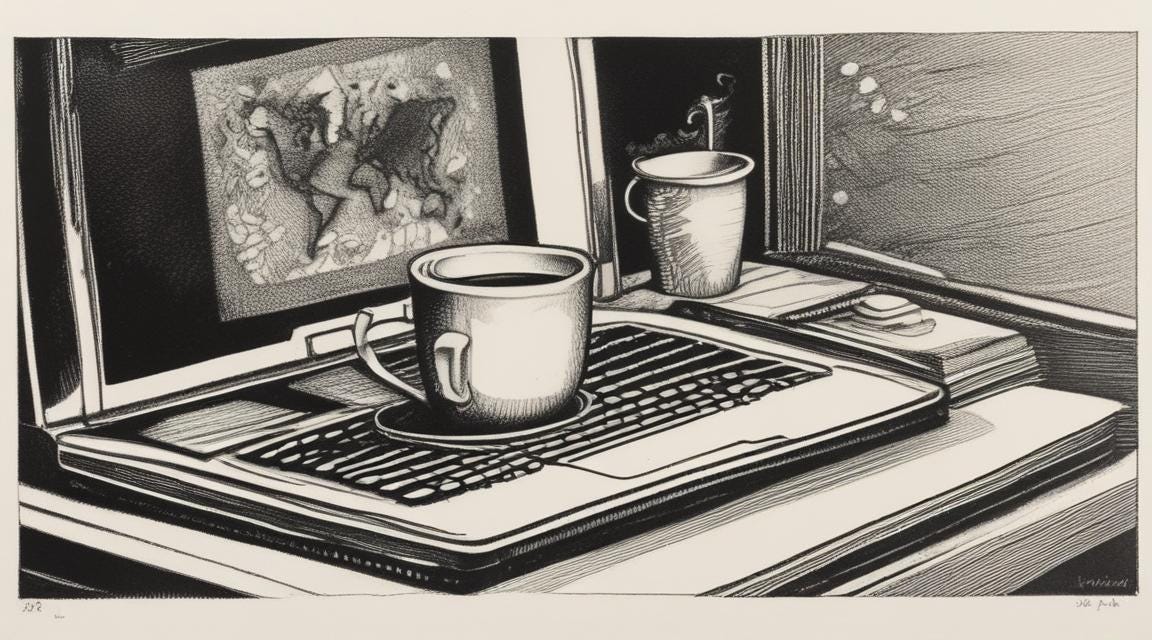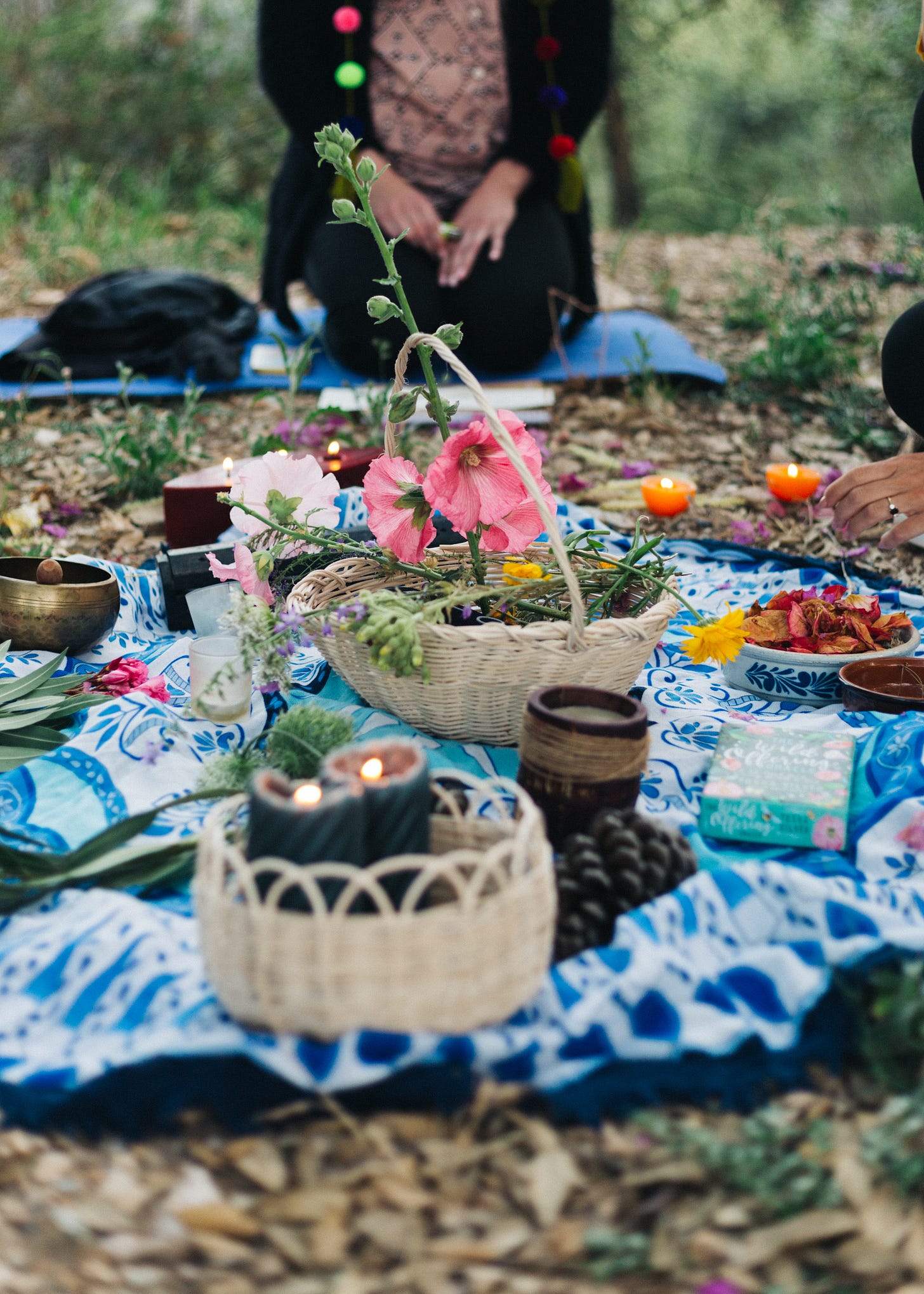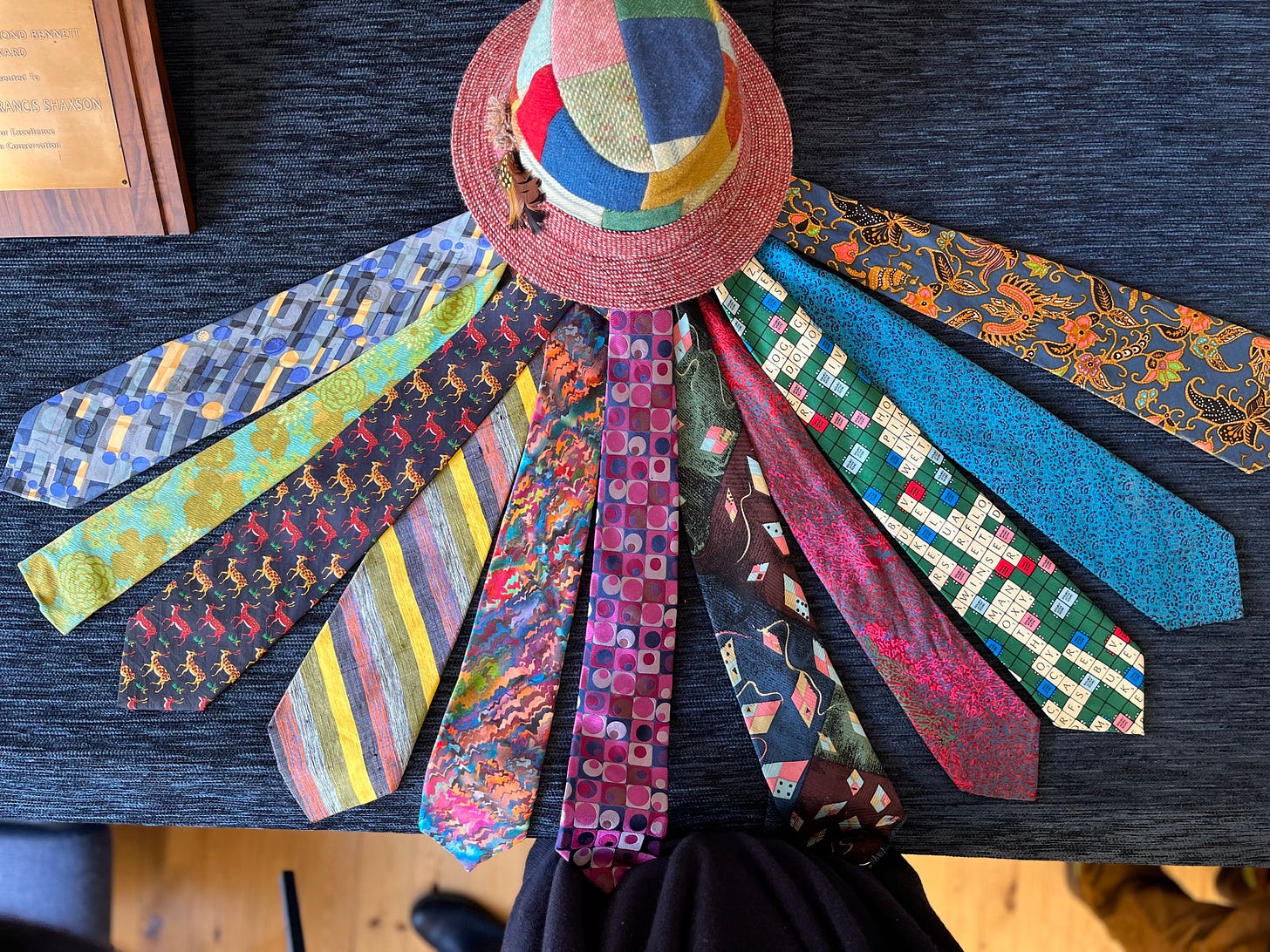Social Superglue
How to harness the power of ritual for work and pleasure
Earlier this year, I took part in an illegal gathering. It was a frosty morning and about 50 people, young and old, were sitting quietly on stone steps leading to a lake. Facing us was a skinny, bearded man, cross-legged on a mat. He was panting. He asked us to copy him as he took 30 rapid breaths in and out and then held the final out breath for as long as possible while tensing all his muscles, squeezing his fists, and rocking backwards and forward, his face going red. I only managed to hold my breath for about 10 seconds before I started gasping. We repeated this cycle three times.
Then, everybody stripped off and climbed over a fence surrounding the lake. About half the group was naked (apart from woolly hats and some diving gloves and socks) and the rest were wearing swimming gear. We gave a collective shout and waded into the chilly water. We had been asked to keep splashing to a minimum. At one point, a police van trundled past. In theory we weren’t allowed to swim here, our guide said, adding the police generally tolerated it if we kept the peace. He told newcomers like me to keep hats on and hands out of the water, only going in up to our hearts.
The hyperventilation exercise was aimed at increasing blood oxygenation and reducing the instinct to flee from the cold. The pain was still intense, particularly on my feet. Most of the other people, regulars I assumed, seemed to be immune. I managed to stay in for about a minute before I became the first person to creep back to the shore. But encouraged by the hardy crowd, I decided I could probably manage a little longer, so I submerged myself for another minute or so. Once out, I saw that my body had flushed salmon pink up to the line across my chest where I had been under water. I dressed and poured myself lemon and ginger tea from my flask. Most of the other “ice dippers” were still in the water. In fact, some of them stayed in another 15 minutes, motionless apart from turning their faces to the sun when the clouds parted briefly, or occasionally checking their watches. I joined the group twice more last winter, each time managing to stay in the water a bit longer, enjoying a rush of endorphins. Afterwards, some people lingered to chat as they sipped tea, but most people melted back into the city within the hour, keen to warm up back home.
The health benefits of cold-water swimming are well documented, but I would never have tried it without joining a group for safety reasons. But I now know that it is much more than safety that brings these people together each week through the dark Berlin winter. There is something very powerful about going through such an ordeal together – and doing it in a ritual way: 10 am every Saturday morning, always three lots of 30 breaths, at the same natural oasis within the Berlin city limits.
Senseless acts?
Since I have read “Ritual - Why seemingly senseless acts make life worth living” by Dimitris Xygalatas, I understand that humans seem to be hardwired for such behaviour, even in our secular world. Indeed, as religious observance has declined, we have invented new rituals that push us to our limits or invoke mass frenzy, like football fandom, marathon running, mountain climbing or music festivals. Even workplace traditions can take on a ritual feel.
Xygalatas, who studies extreme rituals such as fire walking, says participants see them as of existential importance even though they often find it hard to articulate why. His research shows that rituals help us to cope with stress by restoring a sense of control in an uncertain world, and even more importantly, they act as a kind of social “superglue”, bonding people together and giving them a sense of meaning and belonging.

He notes the importance of rituals for workplace cohesion too. When Xygalatas moved to Denmark, he was struck by the short working hours and the frequent communal breaks, parties and retreats that were organised by employers.
“While at first glance, the numerous rituals of the Danish workplace may have seemed odd or wasteful, as soon as I embraced them it became clear to me that they contributed something vital to the efficient, productive and enjoyable work environment.”
Of course, the rise of working from home since the pandemic has made it harder to uphold these kinds of traditions. Many companies have struggled to find ways to replicate them online since the lockdowns.
In the middle of the strict German lockdown in 2020, Reuters marked my 25th anniversary with a heavy trophy, along with an impersonal corporate brochure that proclaimed: “The story of us begins with you… Let’s celebrate this triumphant moment in your career together.”
Unfortunately, there was no celebration due to the pandemic. And perhaps that omission – along with the isolation of working from home - contributed to my decision to leave the company two years later.
Farewell rituals
When I logged off from my last shift at Reuters after writing the daily summary of the Ukraine war, I closed my laptop in my bedroom without a proper goodbye from colleagues and friends of more than two decades. Pre-pandemic there would have been a toast in the office at the very least and probably some flowers.
I did piggyback on the leaving drinks of two other colleagues at a Berlin beer garden and I organised a few rounds at a pub on the Grey’s Inn Road in London where I used to work when I joined Reuters as a graduate trainee in 1995. But it was a pretty casual affair and I wished I – or Reuters - had thrown a more formal party with colleagues past and present, and my family.
I only realised my regret when a close friend recently marked her departure from a journalism job with much more aplomb. Reuters does have a tradition of giving those who leave a photo print from the archives: I chose one of daisies on Lion’s Head in Cape Town by my friend and colleague Mike Hutchings. Hung near my desk at home, it brings back memories of happy times spent in South Africa in the late 1990s. But I only picked it up a year after my departure from the deserted Reuters office in Berlin.
With so many offices still half empty, managers need to have a strategy to recreate the kind of rituals that are natural when we work together in person. The chit chat we share over coffee about our personal and professional trials and tribulations is not trivial. The same is true of the informal conversations that happen on the side lines of events and workshops that I now run. That is why is it is so important to build in enough time for breakout sessions where people can connect, online and offline.
All meetings need an element of considered ritual, especially if we want to build bridges among strangers or people who don’t know each other well. The facilitator of the fellowship I went on last year in Spain were masters of this – they wrote us handwritten welcome notes, organised arrival sharing circles and even made flower crowns for the departure meeting.
For those who read German, The Better Leaders Lab has published a useful report on ways to improve remote and hybrid work in the media industry, including the idea of holding weekly check-in and check-out meetings with teams with nothing on the agenda other than finding out how people are doing.
A wedding, a funeral and lots of birthdays
On a personal level, the last few months have been a whirlwind of family ritual: crying while singing “Morning has Broken” at my father-in-law’s beautiful funeral in Dorset, gathering three generations for my Dad’s 80th birthday party in Northumberland and dancing until midnight at my cousin’s wedding in the Cotswolds.
One thing that is missing is some kind of coming-of-age rite for my teenage sons.
Germans seem to have an unspoken aversion to rituals that perhaps stems from how well the Nazi and Communist machines exploited group psychology. But that means that life at secondary school feels rather barren – there are no assemblies, nor regular communal singing, nor appointments to become prefects.
Some families in the former Communist east still organise “Jugendweihe” parties when their kids reach 14. The Jugendweihe was established as a Socialist alternative to Christian confirmation, but nowadays seems to mostly be about showering the young person with wads of cash, so it is not one I am keen to replicate.
In Britain, many youngsters take part in the Duke of Edinburgh award. It usually involving a few days of hiking in the rain and camping that is a kind of rite of passage, even if it seems very tame compared to the Xhosa circumcision initiation I learned about from friends in South Africa.
Some friends are adopting the practice of celebrating their daughter’s first period. But how should we mark boys becoming men nowadays? Rather alarmingly, my pacifist 17-year-old son just received an invitation for an open-day for the German army. Of course conscription still marks the start of manhood in many countries (something my son’s former friends in Switzerland are now confronted with). Can we come up with something that is not a “ritual of terror”, like the one practiced by an Amazonian tribe described by Xygalatas, where boys are made to wear gloves filled with hundreds of bullet ants?
Answers on a postcard… but not the one we got from the Bundeswehr, please.
What I am reading:
Intimacies by Katie Kitamura - a tense, multilayered story of an interpreter working at an international court in The Hague. I loved her descriptions of the underbelly of the seemingly liberal, progressive Netherlands and her portrayal of the dislocation of being an fly-on-the wall during weighty court proceedings, while also connecting on a human level with the accused and his lawer.
The House of Doors by Tan Twan Eng - a historical novel set in the 1920s in the British colony that became Malaysia. It is centred on the story of a British woman who shoots dead an expat man, told from the perspective of her best friend and the visiting author W Somerset Maugham. But it is also interwoven with the story of Chinese revolutionary Sun Yat-sen, so it was great to read it while listening to this new series: BBC: The Invention of China










Yes Tomas, you and the rest of the Rooral team were great at incorporating moments of ritual into the fellowship that made the experience so meaningful. Can't believe it was a year ago already!
A very interesting morning read dear Emma, and surprised to be part of it some how... worth to share this moment to savour it https://www.instagram.com/reel/CxNqVUpvW1S/?utm_source=ig_web_copy_link&igsh=MzRlODBiNWFlZA== Kind regards Emma!